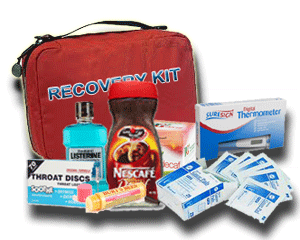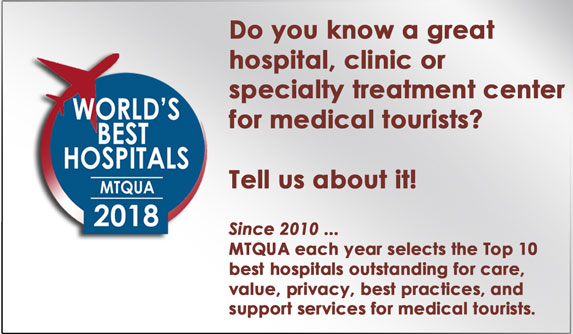 (Part 2 of Medical Travel Agency Business Models)
(Part 2 of Medical Travel Agency Business Models)
I was called out by an official of the Joint Commission International (JCI) many years ago who suggested that staff of Cosmetic Surgery Travel, my medical travel company, may be practicing medicine without a license.
At the time, I was speaking about the care management protocols we use at Cosmetic Surgery Travel to an audience of medical practitioners and health care professionals. I had just described the post-surgery care management and services we provided our clients, including a hospital exit and recovery kit that we gave out after clients were discharged from the hospital to their hotels to complete the recovery.
Medical tourist hospital exit and recovery kit
This hospital exit and recovery kit contained such items as a book on meditation (to inspire clients to relax and “enjoy” the recovery period), decaffeinated coffee and herbal tea packets (to avoid stimulants), coconut water (for rehydration), chocolates and candy.
The kit often contained some or all of the following:
- throat lozenges (to ease a dry throat after anesthesia),
- lip moisturizer (for dry lips after surgery),
- mouthwash (if one couldn’t use a toothbrush after facial surgery),
- individual packets of sterile gauze pads (to pat dry their eyes after eye surgery, and as a gentle reminder to not touch any open wound with their bare hands), and
- a thermometer.
Thermometers as dangerous weapons
As soon as I mentioned the thermometer, a JCI official in the audience commented out loud this was practicing medicine without a license. Several others murmured in agreement.
Are you a doctor? Are you a nurse? they wanted to know.
Why did it matter? Why was it important if I were a medical professional?
In their eyes, it mattered because they viewed our care management program as a service that complemented the health care and treatment clients received at the hospital as patients.
It mattered because our care management program was clearly contributing directly to the patient’s safety and a good medical outcome for the patient.
In other words, because we, as medical travel facilitators, were perceived as taking a role in the health care support of our patients, the medical professionals in the audience expected us to be professional too.
Appropriate care management for medical tourists
So they asked, are we doctors or nurses? If we were not, we had no business behaving as if we were and, in their eyes, “interfering” with patient care.
The question the JCI official asked then remains a very important question to this day for the medical tourism industry: is a medical travel facilitator practicing medicine without a license?
Might a medical travel facilitator who gives a client a laxative, some Tylenols or sunscreen lotion in an act of kindness and consideration potentially create a medical problem for the client?
Is a medical travel company that “simply” books hospital appointments, assists in transferring medical records, or provides CVs and resumes of doctors encroaching on territory that is the purview of a health care professional?
Is a medical travel facilitator who distributes a sheet of pre-surgery instructions practicing medicine without a license?
Practicing medicine without a license
By taking part in these activities, a medical travel facilitator is inserting himself or herself into the health care support chain for the medical tourist. Therefore, some medical professionals argue, the medical travel facilitator may be practicing medicine without a license.
Is there a line that separates travel and tourism related services and health care related services that are provided for the medical tourist?
If so, where is that line drawn between travel and tourism services and health care support services or care management?
Medical Tourism Certification from MTQUA addresses issues such as these so that care support of a medical tourist is appropriately managed according to professional standards from all partners in the medical tourism care and services chain. The medical tourist can be assured of consistent care management at each and every point of the medical travel journey.

 >
>
3 Responses to Are Medical Travel Companies Practicing Medicine Without A License?